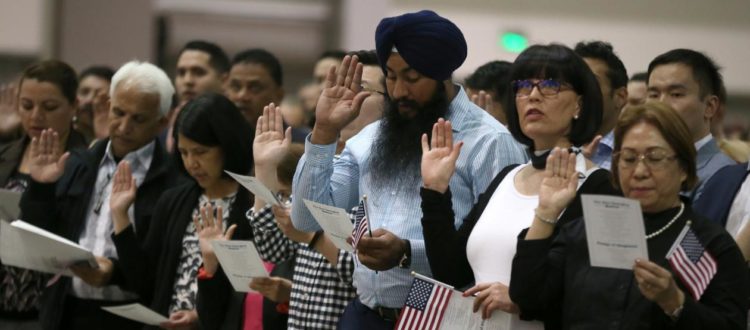Why less is sometimes more when it comes to immigration
Published on August 29th, 2017
By W. James Antle III
August 29, 2017
The Week Magazine
Supporting modest immigration restrictions is a perfectly mainstream position. And yet, it has gotten zero support from presidents of either party for 36 years, save for President Bill Clinton briefly entertaining the recommendations of his immigration-reform commission in the 1990s.
Until now, that is. Among the many fights President Trump has picked in recent weeks, his endorsement of legislation that more closely resembles the immigration reforms Clinton abandoned than those pushed by Presidents George W. Bush and Barack Obama might actually be a good use of his quickly dwindling political capital.
Buried beneath the bluster of his Phoenix rally last week, Trump briefly made the case. "Years of uncontrolled immigration have placed enormous pressure on the jobs and wages of working families, and they've put great burdens on local schools and hospitals," he said. "While this may be good for a handful of special interests, it's unfair to working people of all backgrounds all throughout our country. We want every American community to succeed, including our immigrant communities, but they can't do that if we don't control our borders."
Porous borders aren't the only sense in which immigration is "uncontrolled." The United States admits about 1 million legal immigrants per year. Only 140,000 enter for primarily employment-based reasons. Two-thirds come in based on who their family members are, touching off a wave of chain migration in which new legal immigrants come in, followed by their family members, who are followed by theirs in perpetuity.
That means a lot of new immigrants are unskilled relative to the American labor force, (mostly) unintentionally adding competition to less skilled U.S. workers at the lower and middle ends of the income scale. This group disproportionately includes American-born people of color and other recent immigrants.
A Trump-backed bill introduced by Sens. Tom Cotton (R-Ark.) and David Perdue (R-Ga.) would create a point system for employment-based immigration, prioritizing English proficiency, technical skills, and job offers. It would also limit family reunification preferences to spouses and minor children, in the process reducing mostly lower-skilled immigration. (Elderly parents of these legal immigrants who require care would be eligible for temporary, renewable visas.)
The RAISE Act, as it is called, probably can't pass in its current form or under the present composition of the Senate. But it reopens an important debate more than a decade of "comprehensive immigration reform" talk has suppressed. The cuts to legal immigration (from 1 million annually to half a million over a decade) are no more drastic than the increases (from 1 million to 2 million) envisioned by the failed Gang of Eight in 2013.
Some more modest reforms along these lines could perhaps be enacted in exchange for a humane legislative solution for the "DREAMers" caught in the Deferred for Childhood Arrivals program's legal limbo. The Cotton-Perdue effort is also a countervailing force against those who say immigration must always go up, never down, and must be crafted for the benefit of those who hire nannies rather than workers with high school diplomas.
Yes, more people always means more GDP — by definition. That by itself doesn't mean much for the most vulnerable Americans who are in direct competition with low-skilled foreign labor. The net impact on the country as a whole is often a wash, but the benefits and costs aren't distributed evenly.
There are other factors, ranging from global trade to automation, that are arguably more important to these American workers than immigration. But there is no obvious way to reverse many of those trends at a manageable cost. Regulating immigration is a legitimate function of government in a way that repealing the field of robotics is not.
The uninterrupted inflows are also sapping many Americans' sense of national solidarity, slowing the pace of immigrant assimilation and fueling native resentments. Increasing competition for workers who are disproportionately black and Latino to lower living costs for the affluent or importing low-wage foreign workers to help pay for the retirement of Trump voters does not seem conducive to the social harmony we so desperately need in a post-Charlottesville world.
Trump is not an ideal person to make this case, to put it mildly. Not only is he more interested in symbolic issues like the border wall, but his history on racially charged issues makes his expressed concerns about working-class blacks or immigrant communities sound insincere. His recent pardon of the immigrant-detaining firebrand Joe Arpaio surely doesn't help matters.
Barbara Jordan, the woman who led Clinton's immigration-reform commission and made recommendations similar to some of what appears in the RAISE Act, was a better spokesperson. She was an African-American Democrat who had been active in the civil rights movement. The longtime Texas congresswoman could attract some bipartisan support. And her efforts still came up short.
Jordan wasn't the president of the United States, however. If the person now occupying that office decides to engage in some productive populism rather than the CNN-bashing variety, hopefully Cotton and Perdue will leave a light on for him.





